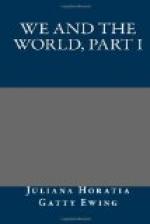The school-master lifted his other hand above his head, and pressed both on it, as if he were in pain. What Charlie was doing I don’t know, but I felt so miserable I could not help crying, and had to hunt for my pocket-handkerchief under the table. It was full of acorns, and by the time I had emptied it and dried my eyes, Mr. Wood was lifting Charlie in his arms, and arranging his cushions.
“Oh, thank you!” Charlie said, as he leant back; “how comfortable you have made me!”
“I have been sick-nurse, amongst other trades. For some months I was a hospital warder.”
“Was that when——” Charlie began, and then he stopped short, and said, “Oh, I beg your pardon!”
“Yes; it was when I was a convict,” said the school-master. “No offence, my boy. If I preach I must try to practise. Jack’s eyes are dropping out of his head to hear more of Bermuda, and you and I will put our whims and moods on one side, and we’ll all tell travellers’ tales together.”
Cripple Charlie kept on saying “Thank you,” and I know he was very sorry not to be able to think of anything more to say, for he told me so. He wanted to have thanked him better, because he knew that Mr. Wood had talked about his having been a convict, when he did not like to talk about it, just to show Charlie that he knew what pain, and not being able to do what you want, feel like, and that Charlie ought not to fancy he was neglected.
And that was the beginning of all the stories the school-master used to tell us, and of the natural history lessons he gave us, and of his teaching me to stuff birds, and do all kinds of things.
We used to say to him, “You’re better than the Penny Numbers, for you’re quite as interesting, and we’re sure you’re true.” And the odd thing was that he made Charlie much more contented, because he started him with so many collections, whilst he made me only more and more anxious to see the world.
CHAPTER VII.
“Much would have more, and lost all.”—English Proverb.
“Learn you to
an ill habit, and ye’ll ca’t custom.”
Scotch
Proverb.
The lane was full of colour that autumn, the first autumn of the convict’s return. The leaves turned early, and fell late, and made the hedges gayer than when the dog-roses were out; for not only were the leaves of all kinds brighter than many flowers, but the berries (from the holly and mountain-ash to the hips and haws) were so thick-set, and so red and shining, that, as my dear mother said, “they looked almost artificial.”




